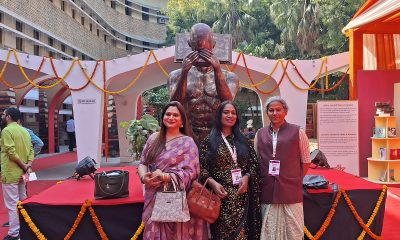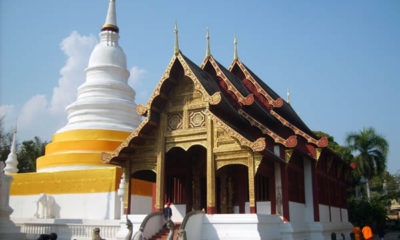Miscellaneous
Oral arguments in India marriage equality case end
It remains unclear when justices will issue ruling
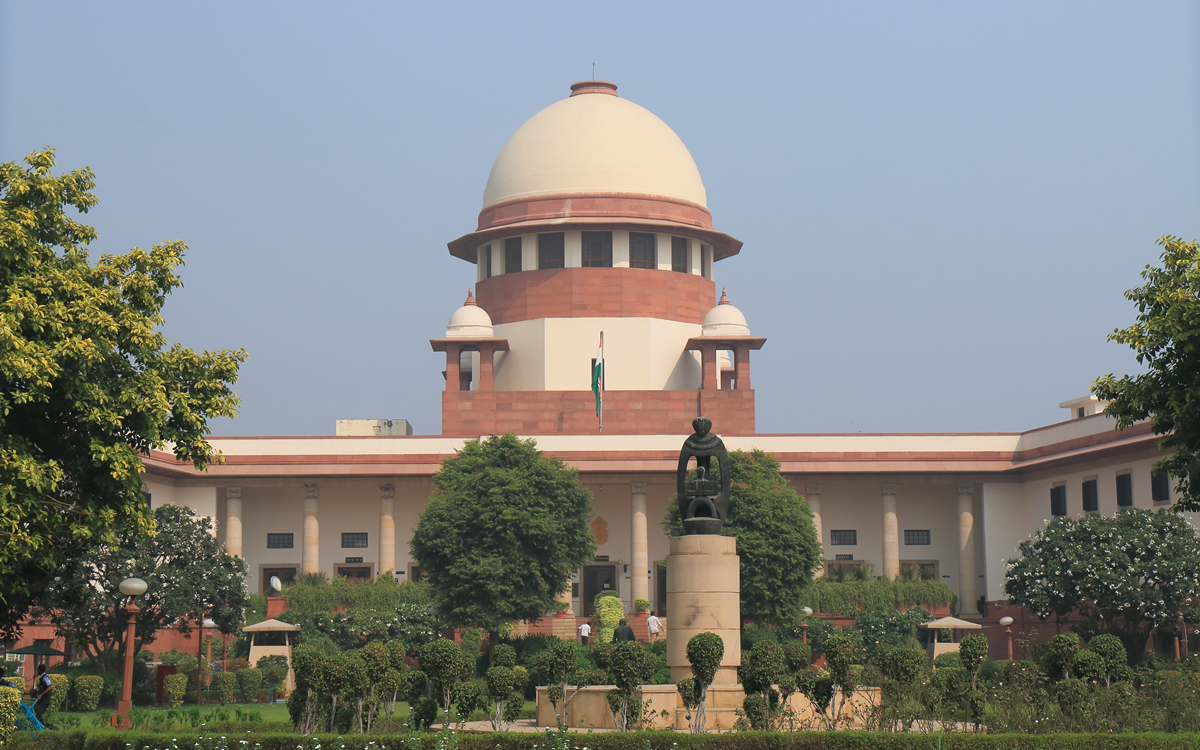
NEW DELHI — Oral arguments in the case that could extend marriage rights to same-sex couples in India ended in the country’s Supreme Court on May 11.
The arguments began on April 18.
“We are persons of the same sex, and we have the same rights as like the heterosexual groups of the society this has been held so, and we need not reinvent the wheel and only stumbling block was Section 377, and our actions were subject to criminality, and now it is gone,” said Mukul Rohtagi, a lawyer who represents the plaintiffs, in support of marriage equality. “If our rights are identical and then we should enjoy full array of rights as under Articles 14, 15 and 21.”
The Indian government argued against extending marriage rights to same-sex couples.
“This court is dealing with a very complex subject having a profound social impact,” said Solicitor General Tushar Mehta, who is the country’s second-highest legal official, during the arguments. “All the questions in this case must be left to the Parliament.”
It remains unclear when the court will issue its ruling.
Miscellaneous
Gay bar in California bans MAGA gear — but no other political expression — from its premises
MAGA is a terrorist threat to the LGBTQIA+ community
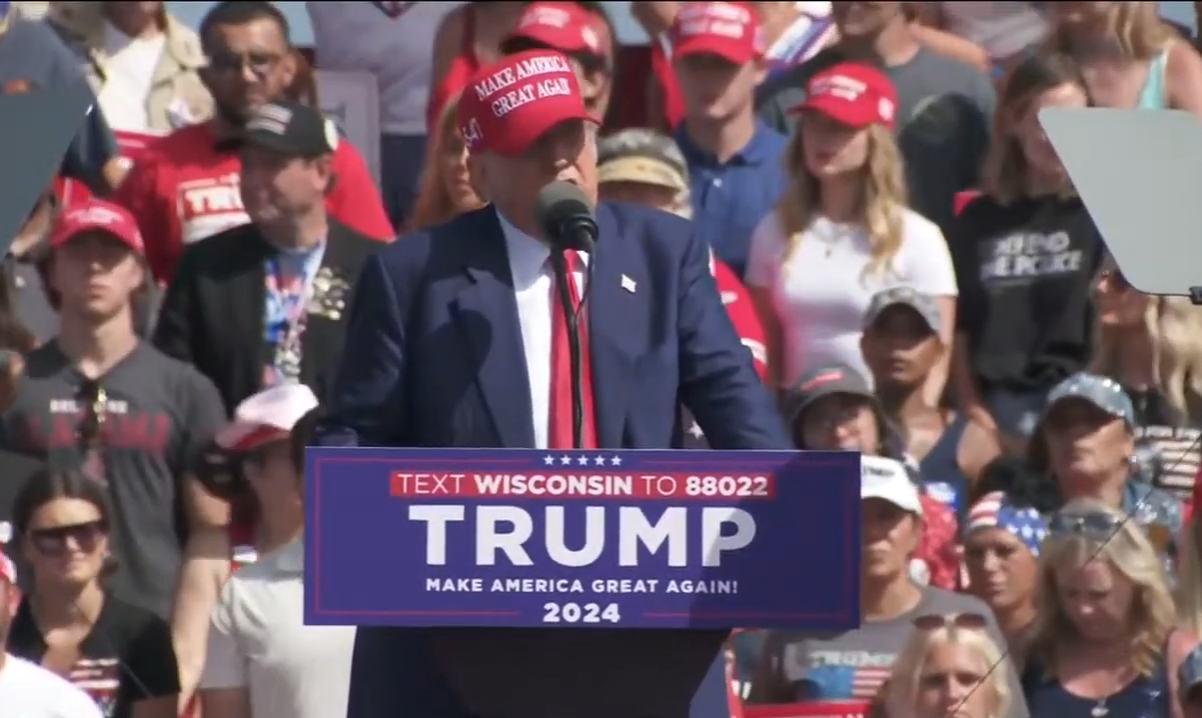
Do not let anyone bait you into a “both sides” argument on this topic. Trans people can confirm that we no longer live in a country where freedom of expression exists in the first place, so the point in and of itself is moot. Don’t waste your energy.
But especially don’t be shamed by those who imagine themselves to be more enlightened than you as they make the tired false equivalence that MAGA is just another political ideology that deserves the same freedom of expression as liberal points of view.
The owners of the Badlands Bar are keeping their patrons safe from terrorism. Yes, MAGA is a terrorist threat to the LGBTQ community. Oxford’s definition of terrorism is “the unlawful use of violence and intimidation, especially against civilians, in the pursuit of political aims.”
It’s too long a list for this article, so here’s a link to a running tally of the government’s actions against the LGBTQ community since Jan. 20.
It started, on Trump’s first day as president, with trans people being forcibly stripped of their very identity — and with it, all protections — under the law. This trend has continued, ominous drip after ominous drip of frequently illegal Executive Orders that dehumanize, disenfranchise and dismantle the basic rights and dignities of trans and queer Americans. If you’re following the Project 2025 playbook, as the federal government is, you’ll notice that ending marriage equality is quickly coming up on MAGAs To Do list.
All of that—the bullying, the emotional and psychological abuse, the stripping of rights, the (eventual, inevitable) tearing apart of families—is violence, by definition. The anxiety you feel every day as an LGBTQ American? That’s intimidation. And that is why living under MAGA as an LGBTQ person means living in a terrorist state.
Perhaps the idea that MAGA perpetrates outright terrorism seems dramatic, especially for those who remember 9/11 and maybe we don’t need to add more drama to this historical moment.
Then let’s consider the terrorism of words and ideas.
Stochastic terrorism, is a particularly nasty form of political expression, where those with cultural power spout hostile rhetoric about a group, creating a culture of hate that inevitably — but not directly — results in violence. When we talk about haters becoming emboldened by Trump’s rhetoric, this is the dangerous potential that absolutely does become reality.
The insidious part of stochastic terrorism is that there’s plausible deniability on the part of the instigators. Truly, who do we blame for the murder of Lauri Carleton in Lake Arrowhead, CA?
Do we blame the individual who shot her after he screamed epithets about the Pride flag she flew in front of her store? Or do we blame the talking heads and podcast hosts who were then spending untold airtime equating LGBTQ people with pedophilia and grooming? Or do we blame the governors who sought to ban the flying of Pride flags in public, for turning them — and all of us who fly them — into high-profile lightning rods for hate? Who should be charged in a court of law for this hateful crime?
If any comparison to terrorism still seems too far-fetched to you, even for MAGA, then let’s consider the term “gang.”
Flip all the racist rhetoric you’ve passively absorbed about the kinds of people most likely to be in a gang, and consider Donald Trump, the current Republican Party, and MAGAs specifically as you read the following definitions of what a gang is.
According to the Department of Justice:
- Gangs adopt a group identity in order to create an atmosphere of fear or intimidation.
- Gangs are typically organized upon racial, ethnic, or political lines and employ common names, slogans, symbols, hand signs, or style of clothing.
- The gang’s primary purpose is to engage in the use of violence or intimidation to enhance or preserve its power, reputation, or economic resources.
If we hold MAGA to the DOJ’s gang standards it so easily fits into, perhaps we can more easily hold that most businesses explicitly bar gang symbols from their premises, often as an easily-enforcible safety measure, and consider the Badlands Bar owners’ actions in that context.
But if you’re still suspicious of any of this rhetoric, then all that’s left is to consider the reality of MAGAs actions, which owners of LGBTQ bars around the country experience on a regular basis.
On Feb. 22 at Scorpio, in Charlotte, NC: an exception made to a “no political affiliations of any kind” dress code, devolved into the individual making transphobic remarks at the entertainers during the drag show. He refused to leave when asked and became aggressive toward security, resulting in police intervention.
On March 14 at the Chatterbox Jazz Lounge in Indiana, MAGA hat-wearing patrons aggressively misgendered and harassed a bartender and were ejected. The video of the altercation went viral; the owner reports his bar has since received several threats of arson and bodily harm.
Four days after the video of that incident went viral, the Chatterbox Tavern in Tennessee received threatening emails and phone calls.
These incidents were flashpoints that reported, often by MAGAs claiming victimhood. Untold incidents go unreported due to intimidation or uninvestigated due to bias. According to GLAAD’s 2022-24 ALERT Desk Report, over 1,850 anti-LGBTQ incidents were reported across all 50 U.S. states. That’s more than 600 acts of vandalism, bomb and mass shooting threats, assaults, and cases of arson per year — nearly two per day. These incidents have resulted in at least 161 injuries and 21 deaths. The perpetrators — when apprehended or known — wore MAGA gear, screamed MAGA slogans, had shared MAGA rhetoric online, or were members of MAGA-associated groups like the Proud Boys, Q-Anon, Three Percenters, Libs of TikTok and Moms for Liberty.
If after all of this — and the rest yet to come — you still believe that MAGA simply represents an opinion about a stance on taxes, individual liberties and the size of government, then this author will be the bigger person and acknowledge your identity as part of America’s inherent Diversity, wholeheartedly Include you as an Equal in this vast multiplicity to which we belong called America.
And then ask you, if it’s all directly equivalent: when will MAGA do the same for LGBTQ people?
Of course you are free to wear your red hat and shirt wherever you please — your gang runs this place, after all. You’ll even be pardoned for violence you commit, like the Jan. 6 terrorists and your poster boy Kyle Rittenhouse. Don’t fret.
But don’t expect us not to protect our own just because we’re a bunch of queers.
The author of this Op-Ed wishes to remain anonymous for safety reasons, given the nature of the issues discussed. Citations are linked to GLAAD’s expert resources, but this Op-Ed was not written by anyone affiliated with the organization.
Arts & Entertainment
Mr. BarBareians 2025 is crowned!
Precinct DTLA was home to the first-ever Mr. BarBareians competition, celebrating sensuality and queerness.
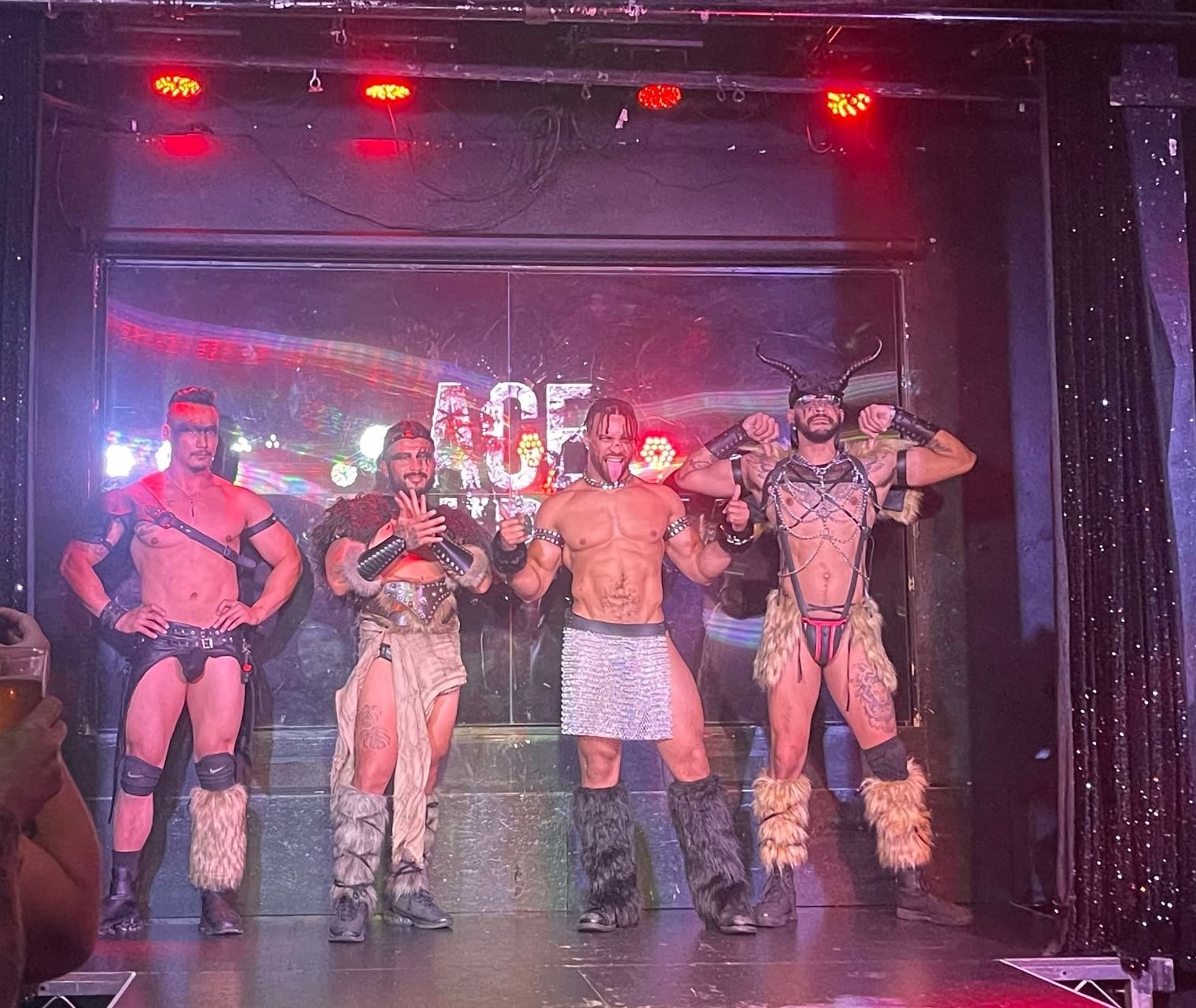
Last weekend Los Angeles Blade was on the scene and one of the guest judges alongside Los Angeles personalities from the adult and nightlife world including Meatball, Dean Michaelz, Adam Keith, Mr. Sister Leather 2024, Colin MacDougall and Mr. Precinct Leather 2024 to crown the first ever Mr. BarBareians at Precinct DTLA.
The Mr. BarBareians is a nod to the male beauty pageant, just a bit edgier and dare we say, sexier? Four contestants competed against each other in a series of categories that included talent, walk, pose, looks and Q&A.
The pageant’s debut contestants consisted of popular nightlife dancers Judas King, Han Cross, Ace Newbury, and De Hanno. The evening was emceed by Leatherman Moshiel. Playing on the barbarian theme, Precinct’s staff and a number of the patrons were dressed accordingly, adding some skin and muscle to the evening.
The show was well-produced and the contestants certainly gave it their all. There was not a weak contestant among them and the scoring was very tight. As our bold emcee remarked, these contestants are more known for their bodies than for their prose, so a few faltered during the Q&A.
As a fun bonus, illustrator and performance artist Jonathan Kidder was on hand, doing his famous quick sketches. Miraculously, he is able to capture the essence of a person in a matter of a few strokes of the pen. He was able to do a portrait of the entire cast in 60 seconds.
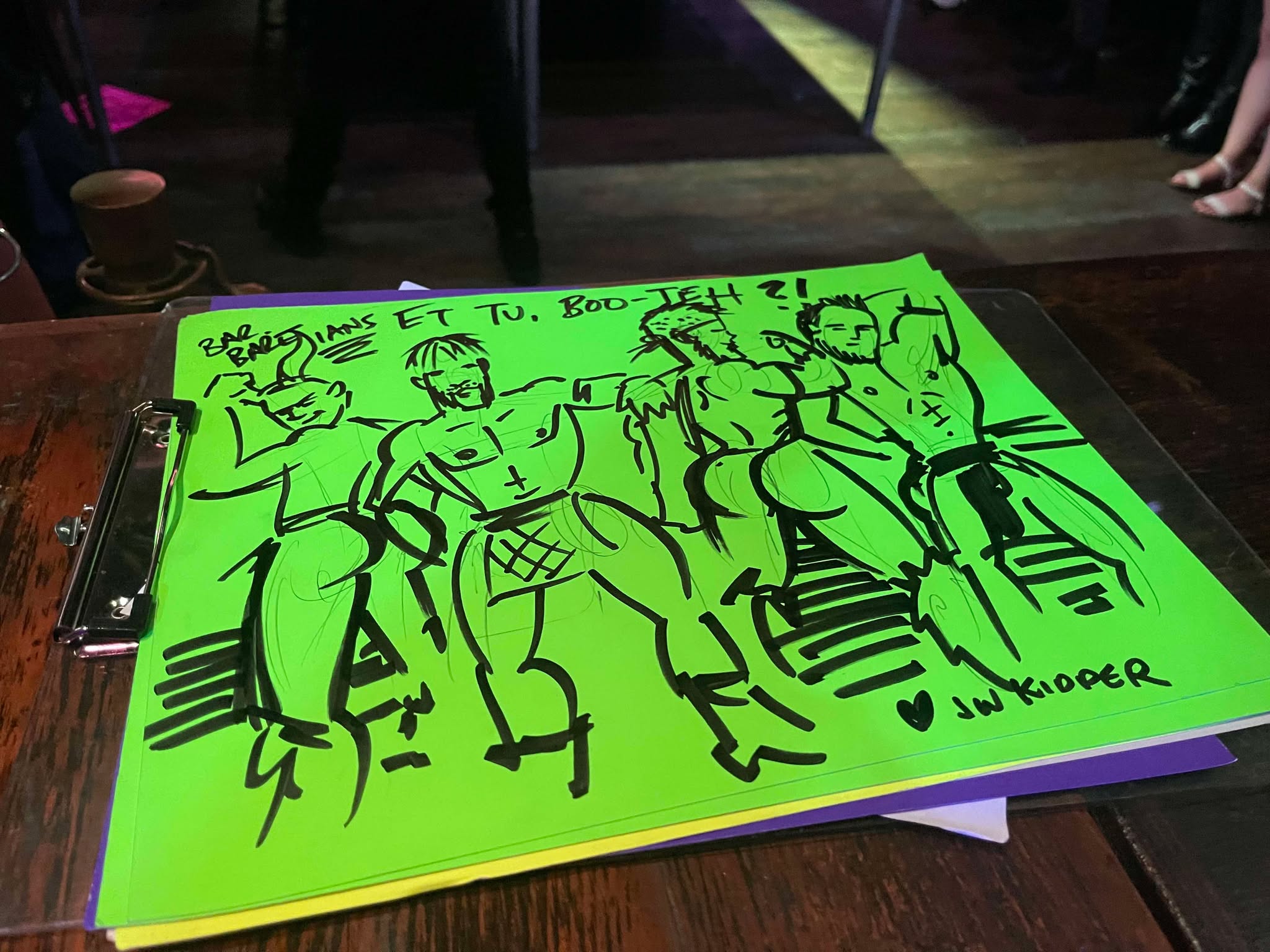
Work by Illustrator JW Kidder
LA-based veteran nightlife photographer Dusti Cunningham was feeling the spirits as he roamed around and captured the evening in his signature style, catching the crowd and the cast in their finest and sexiest.
After a short tally of the scores, De Hanno was crowned Mr. BarBareians 2025.
His winning personality and consistent talent across the categories, together with his winning assets, set him apart from his fellow contestants. In the end, everyone was a winner because the cast clearly had a good time and supported each other during the show.
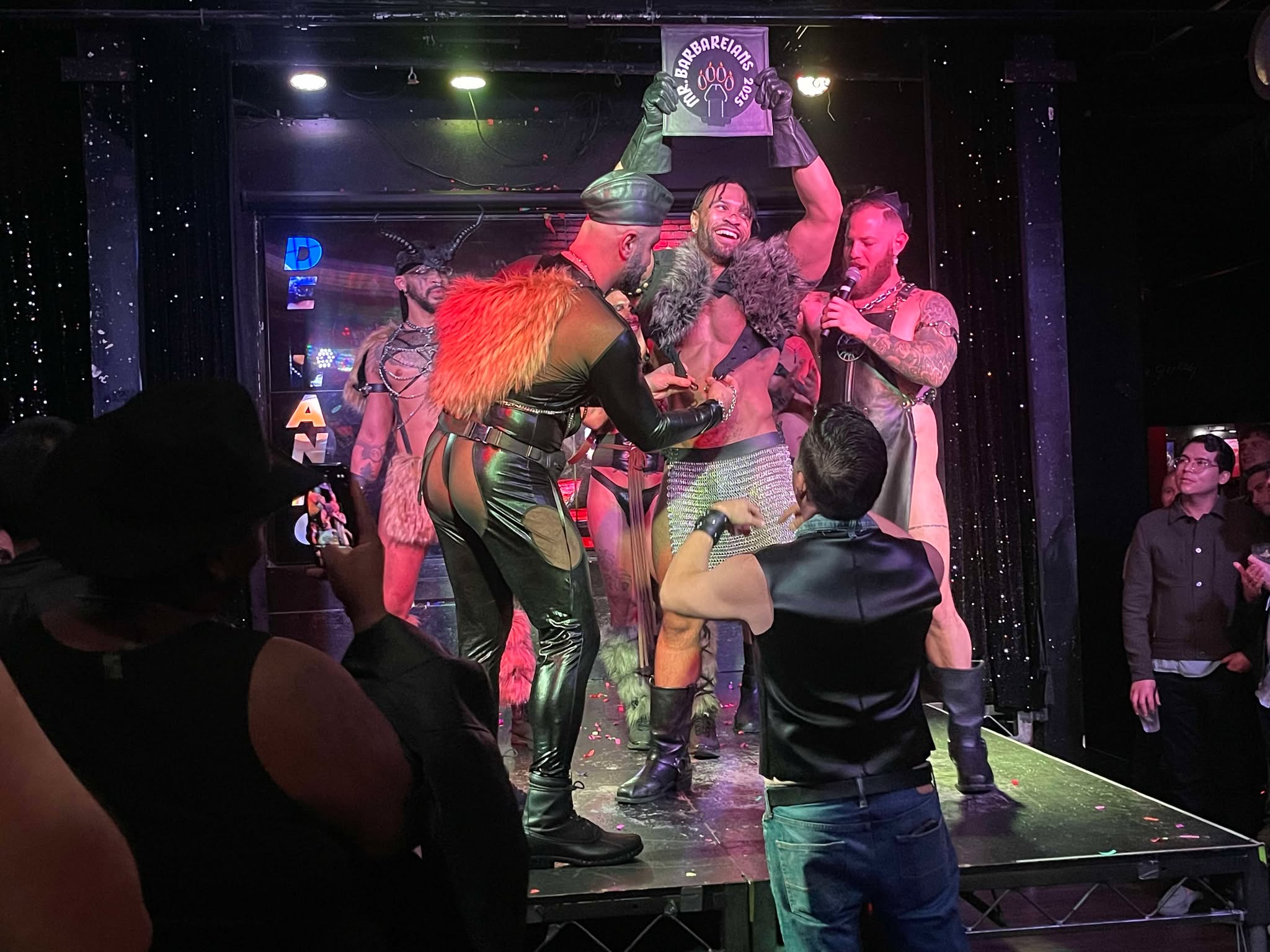
De Hanno named Mr. BarBareian 2025 / Photo by LA Blade
Precinct couldn’t have been a better venue to hold the event. Not only does it have ample space to accommodate the large crowd, but it has a great staff, stiff drinks, and stellar stage and lighting. We also love the sense of community here. Everyone is welcome under the club’s roof. Gay, straight, queer, trans, bears, twinks, leather lovers, and everything else under the sun. No one feels like an outcast or a stranger and it has become the ultimate safe space for the queer community in Los Angeles. This is how we should be congregating in fellowship, especially during these trying times. Precinct offers a great atmosphere for those who are looking to expand their experience past the Weho crowd (not that there is anything wrong with Weho, we are there all the time as well).
Mr. BarBareians and the BarBareians parties are produced by Hump Events, also responsible for Los Angeles’ Turbo for the dance crowd, Hump night celebrating the Middle Eastern community, and Steam for the cruisers. Like Precinct, they believe in representing the community and everyone is welcome.
Hats off to the first Mr. BarBareians, we will be waiting with our scorecard for next year!
a&e features
Pose’s Dyllón Burnside takes on most ambitious role yet in latest film
In this Blade exclusive, actor Dyllón Burnside gives us a candid look at his latest role

Actor Dyllón Burnside made an impressionable splash by playing Ricky Evangelista in FX’s Pose. Not only was he able to infuse sincerity and pathos into his role, but he has used his platform to speak against toxic masculinity, advocate for LGBTQ safe spaces and inspire activism.
Recently, he has partnered with BET+ for the film Fighting To Be Me, playing perhaps his most ambitious role to date. Dyllón plays Dwen Curry in a new biopic where he plays a celebrity stylist known for working with big names like Missy Elliott, DMX, Mariah Carey and more.
Leading a double life in many ways, Dwen also spearheaded a multi-million dollar fraud ring that came to be known as The Gay Gangsters. The film is part true crime, part Hollywood glam and all LGBTQ+ storytelling. The film is about family, identity, survival and self-acceptance as Dwen transitions from a gay man, to a proud transgender woman.
The film comes at a crucial time, where the nation is experiencing cutbacks in DEI initiatives that are affecting both the Black and the queer community. Fighting To Be Me is the latest in BET+’s efforts to highlight stories from the queer community.
Representing both the Black and queer communities in this film, it was essential for Dyllón to portray Dwen in a way that was both truthful and sincere.
We chatted with Dyllón ahead of the film’s premiere about his experience.
“It’s unlike any other project that I’ve been a part of. I have my processes and the things that I do as an actor to prepare that are my baseline. It’s rooted in my background in the theater and the things that I learned from my teachers in drama school and the different directors that I’ve worked with.”
But this process, while those things definitely helped Dyllón, there was so much of that, that Dyllón couldn’t pull from. He says he had to really stretch himself to immerse himself in Dwen’s story and world.
“I had a lot of conversations with her. It required me to be more curious than I think I’ve ever been in a role. I’m a seeker in that way, and I think that’s what I really love about working as an actor is really that process of discovery and getting curious and finding connections and doing the research. I love that kind of stuff.”
Dyllón was not familiar with Dwen’s story at first. After reading the script, he was compelled to tell her story, but it was imperative that he received the blessing from Dwen herself.
“I needed to have a conversation with her to make sure that she wanted me to play her. I wanted to be clear that this person, this trans person wants me to play them and they feel like I am the right person to portray them in this story. We had a beautiful conversation and it was that talk, just getting to look her in her eyes and understand her heart that made me decide I want to be a part of this project.”
Fighting To Be Me comes at a time when the nation is divided. Dyllón’s involvement as both the star and as one of the film’s executive producers is a testament to his belief that now is the time for this story to be shared.
“When we look at the times that we’re living in, when trans people are being attacked daily by the current administration, it is really troubling. The dehumanization of trans folks has gotten out of hand. I think we need to all have the opportunity to sit with the fact that my lived reality is not the same as someone else’s reality, but that doesn’t make their lived reality any less human or any less important or any less true.”
“I think that one of the beautiful things about this story is that it’s unlike any other story that I’ve ever heard or told. Yes, there’s the trans element, but it’s a full life story. It’s important to talk about trans issues as a means of advocacy. I’m also really interested in talking about Dwen Curry as a human being. What are the circumstances that conspired to create the situations that forced Dwen Curry to make the decisions that Dwen Curry made? We’re talking about the socioeconomic climate of the eighties. We’re talking about the politics of the eighties. We’re talking about HIV and AIDS. We’re talking about the stigma around being queer. We’re talking about poverty. All of these issues conspire to create a situation where the wind has to make certain decisions in order to survive and thrive.”
According to Dyllón, the story directly relates to what is happening right now. He elaborates:
“So many of us find ourselves in that position right now where there are all of these different systems and institutions that seem to be closing in around us and putting us between a rock and a hard place. We have to figure out how to stay true to ourselves. How do we protect ourselves? How do we eat? How do we stay safe from the cops shooting us down in the streets or from some person who hates us because of the color of our skin, or our gender or sexual identity? All of these things create a situation for people that drives them to make really hard decisions. And I think I’m more critical of those systems than I am the individual who is forced to exist in those systems.”
BET+’s inclusion of queer stories is a milestone. Typically, minority programming was resistant to talking about queer people. As part of that representation with Pose and now with this film, Dyllón has his take on the growing trend of inclusion.
“I may not say that minorities don’t celebrate folks, but I will say that historically we’ve seen that the media companies across the board have not supported stories. I think folks see we’re able to recognize the cultural impact as well as the fiscal benefits of telling more inclusive and expansive stories about who we are, who we get to be. I hope that continues. I hope we continue to see that in spite of all of the efforts to roll back DEI, and that media companies will stand firm in their commitment and desire to tell stories, real authentic stories about real authentic people.”
Totally giving himself over to the portrayal of Dwen on her journey of self-discovery and acceptance, Dyllón has started to look at his own relationship with identity and being true to himself. It is the message he has for himself, it is the message he has to his fans.
“One of the things that I’m really striving for in my life is integration, this idea that I don’t have to be a separate human being with my family that I am with my friends, that I am at work on set, that I am on stage, performing my music, that I am in the recording studio, that I am when I give a speech somewhere as the advocate in a political space. I don’t have to compartmentalize myself in those ways and I get to bring all of myself to every space that I’m in, even if that means I’m overwhelmed, or I’m tired, or I’m stressed, or I’m afraid.
The conversation that I’m having with myself in this moment, and by extension having with my audience, is this message around integration. And standing firmly 10 toes down in the truth of who I am and allowing that to be messy and allowing that to be uncertain and weird and to be unapologetic about the messiness and the weirdness and the lack of clarity.
Just show up as your full self wherever you find yourself and trust that your spirit will lead you and guide you in the way that you should go. Unplug from social media and get outside.”
Fighting to Be Me: The Dwen Curry Story is now available on BET+
Community Services - PSA
Heal in community at these upcoming mutual aid events
These upcoming events will donate proceeds to fire relief funds and directly impacted community members
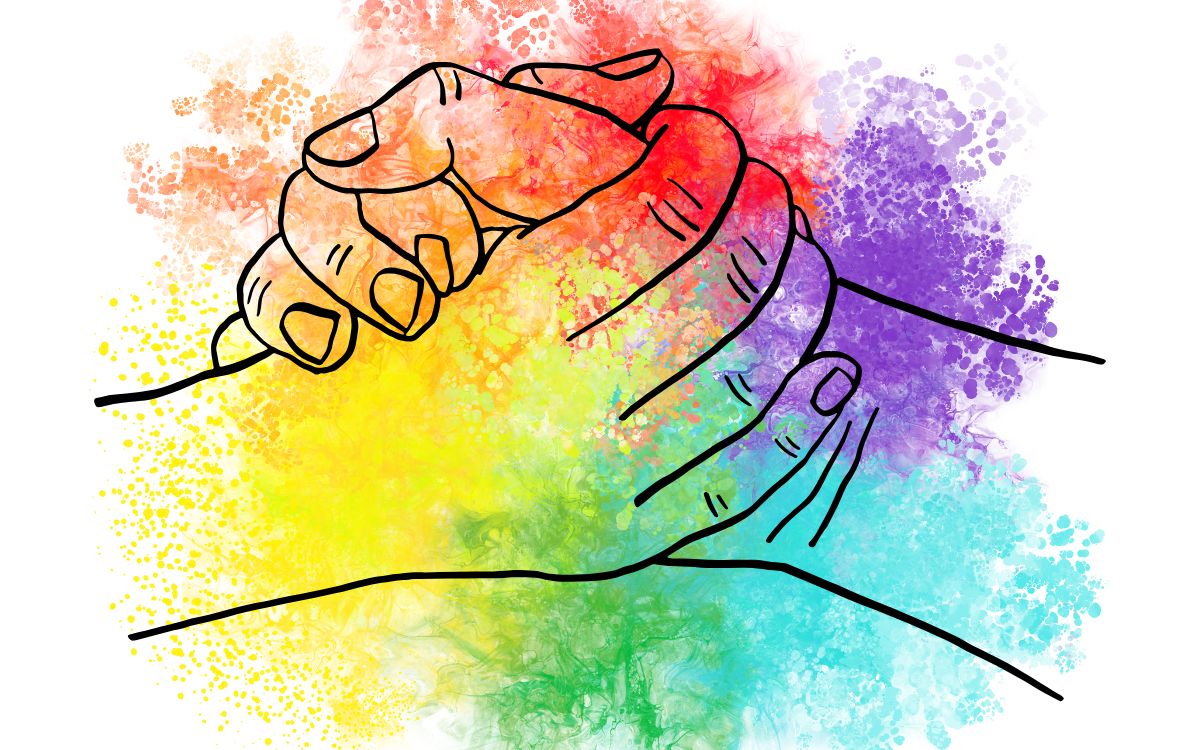
If you are in need of resources, services or just a distraction from the onslaught of devastating news, we’ve compiled a list of upcoming events and organizers who are helping heal the community.
Stud Country will be hosting an event at Club Bahia on Jan. 20, where they will make matched donations for dance lessons at 8:30 pm and 10 pm, in financial support of those affected by the LA fires. Stud Country is an event organizing brand aimed at preserving and celebrating the legacy of queer dance spaces and honoring the rich history of LGBTQ+ cowboy culture. They host regular events and dance lessons across San Francisco, New York City and Los Angeles.
Bar Flores LA will be hosting their weekly event, The World Is Our Oyster this Thursday, Jan. 23 at 7 pm, geared at uniting the queer community through drag, dancing, DJ sets, tarot readings and eating oysters. On their Instagram post, they stated that a percentage of the proceeds will be donated to the California fire relief efforts.
BabyGay, a nonprofit aimed at building inclusive community spaces, issued a statement through their newsletter saying that they had to evacuate from their home during the peak of the fires, unsure if they would ever be able to return.
“In times of crisis like this, our strength lies in our unity and ability to support one another,” said the statement.
BabyGay LA is hosting a LA Queer Events Coalition at Center Silverlake on Jan. 25 from 1pm to 3 pm. The event will be moderated by Carla Ibarra from the LA Civil Rights Department and hosted by Chanel and The Circus, as well as Miss Marquez from Empowerment in Heels. Together, they will guide the community through an afternoon focused on support and immediate assistance. They will also be offering support from on-site therapists by the Open Space Therapy Collective, grounding yoga led by With Love Projects, direct access to essential resources and services, and more.
Trans Dudes of LA, Yes Ma’am Club, Whxremones LA and The Gay Agenda LA are co-hosting a benefit fund called Back On Our Feet, at Sassafras Salon on Jan. 25 from 7 pm to 1am. On their Instagram, they posted that ‘100% of the sales will be donated to the organizations supporting victims of the current fires in Los Angeles.’The suggested donation is $5 for tickets that can be purchased through Eventbrite. According to their post, the night will feature drag, DJs and dancing.
Butchona will be bringing back their event to Little Joy Cocktails in Echo Park on Jan. 26 from 4 pm to 9 pm, featuring the OG DJ’s that brought this event to the queer Latin American community of LA, playing corridos, quebraditas, banda and more. They will also be featuring special guest DJ Todo Trankiloski, who’s part of the Chulita Vinyl Club – a DJ group who plays vinyl sets and recently celebrated 10 years of building their brand and QTBIPOC support system. Though the event is always free, they will be accepting donations for 2 families directly impacted by the Eaton Canyon fire, as well as CHIRLA, the Coalition for Humane Immigrant Rights, supporting the immigrant communities of LA.
Mariposx Healing will lead a Somatic Soothing Zoom event in collaboration with Liberatory Wellness Network and Pat.Radical.Therapist, for people affected by the L.A fires on Jan. 28 at 6pm.
“This session is for people affected by the Los Angeles fires. Azul of Mariposx Healing will hold space for expression of emotions through somatic practices, movement, chanting and drum medicine,” reads the IG post.
Perverse4Verse will host their next event on Jan. 30 at the Heavy Manners Library, with a $10 suggested donation and all proceeds going toward a fire relief fund for the community. The theme of the event is collective healing, as they will be featuring community organizers and poets who will be gathering to celebrate leather love and collective care through poetry, togetherness and education. This event is hosted by Karla Lamb, a well-known community organizer in queer literary spaces.
Butch Monthly LA is hosting a donation-based event on Jan. 31, from 6 pm to 8 pm at the Rediscover Center Mid City. They will be hosting a Zine-making night in collaboration with Rebuild, to fundraise for LA Fire relief which will be ‘open to butches and those who love them,’ according to their IG post.
Lesbian Goth Night postponed their monthly event set for Saturday Jan. 11, in light of the fires and devastation felt by many community members and their loved ones. They will now be holding the event on Feb. 7 at 9:30 pm to celebrate Valentine’s Day, honoring the tickets from January’s cancelled event and opening up sales to welcome more people.
“We understand that the weeks have been heavy, as we are too still processing the devastation surrounding the fires,” reads an Instagram post by Lesbian Goth Night. “We were very much looking forward to our January event and seeing all the new and familiar faces\, but throwing the event during that time didn’t feel right on many levels.
California Politics
Ysabel Jurado: A political maverick changing the narrative in LA politics
Jurado says it’s time for something different and she is it.
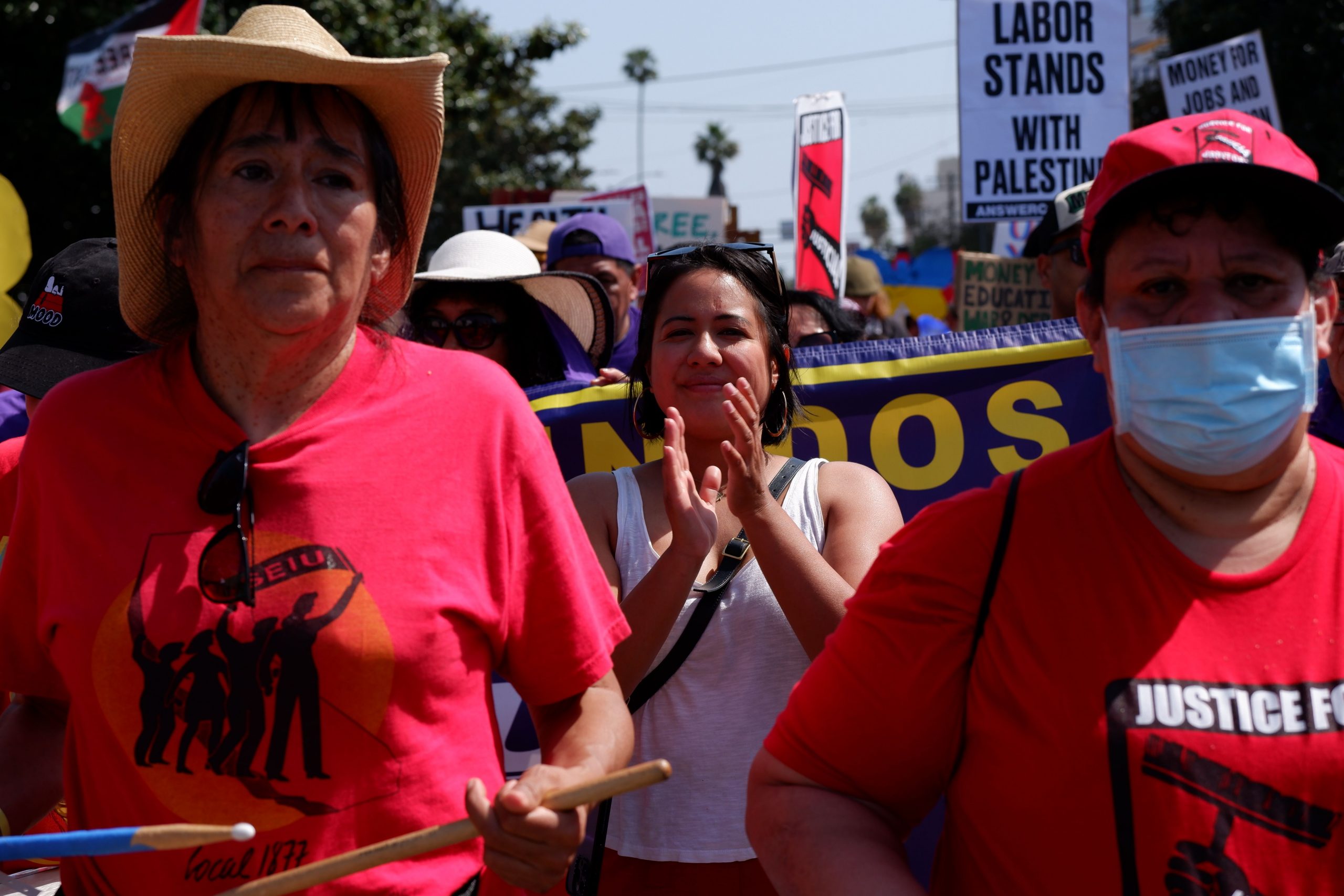
Tenant rights attorney Ysabel Jurado is known as the progressive, grassroots candidate in
the race for the hot seat that her opponent Kevin De León currently holds in Council District 14, even after years of recalls following a racism and homophobia scandal.
Jurado says it’s time for something different and she is it.
“I’m an API woman, I’m educated, I’m a citizen and English is my first language–
among others,” said Jurado in an interview with Los Angeles Blade. “And I’m also proud that on this team, we are largely led by LGBTQ+ folks, women of color, and people of color.”
As an out candidate, Jurado says she is intentional about the people she hires as part of
her campaign team. She is inclusive of nonbinary people and anyone who identifies as part of the QTBIPOC and LGBTQ+ acronyms, because she doesn’t just want to talk about them, she also wants to incorporate their lived experiences in her campaign mission. She says this in part
because of her own identity, but also because of the scandal that rocked De León’s political career.
The scandal follows various City Council members of CD-14 ranting about other BIPOC
members of Council and their LGBTQ+ families. The leaked audio recording included her
opponent De León — who at the time had his eyes set on running for mayor of Los Angeles.
“A lot of the groups talked about in these tapes are the people that we’ve recruited and
who we are making sure to build a coalition with,” said Jurado.
Going into this campaign race, she asked herself: ‘How do I go into this institution and
not become the worst parts of it?’
“If I ever become that, I want you to put my feet to the fire and shift me out of there,
because at that point I have betrayed myself,” responding to the question she had asked herself.
Jurado is currently facing backlash from many community members who support the
police force in Los Angeles, after she was elicited to respond to a question regarding her stance
on police funding. Some of those community members are now actively pushing for her to drop out of the race for Council District 14.
According to NBC4, family members of fallen Los Angeles Police Department officers
have spoken out to say they worry the remarks she made in regards to her stance on police
funding would hurt the LAPD’s ability to recruit new officers.
“In a meeting with students at Cal State LA, I quoted a lyric from a song that’s been part
of a larger conversation on systemic injustice and police accountability for decades…,” said
Jurado to NBC4.
Later, other news outlets reported that the person who elicited the ‘f-ck the police,’
response from Jurado, was a staffer working for De León.
“When you look at what I say and when you look at what I’m doing, I walk the walk and
I’m not going to take any bullshit sitting down, even though [De León] tries,” said Jurado in an
interview.
Jurado has been campaigning for this position since last summer and has since made
dozens of headlines that suggest she is a political force to be reckoned with and has been
building gains in the mostly Latin American Council district. She also brings up the long and problematic history of candidates and elected officials who have resigned, been indicted for corruption, or who have been asked to ‘step down over shady backroom deals.’
“The focus isn’t about me and him and what petty back-and-forth things we say, it’s
about our communities and wanting to make sure we talk to voters and rising above. Because at the end of the day, it’s about the work,” said Jurado. “It’s not about the noise and trying to bring it back to who gets hurt by all these conversations, which are the constituents.”
Jurado is an out LGBTQ single mother and lifelong resident of Highland Park who has
tirelessly fought for tenant rights and protections during her time as a tenants’ rights attorney and housing justice advocate. She prides herself in being a self-made politician who started her journey at Pasadena City College, then earned her bachelor’s degree at University of California, Los Angeles and then went to law school.
Jurado then went on to fight gentrification-driven displacement and in her candidate
statement, she says she spends her days protecting neighborhoods from corrupt developers and politicians.
“This campaign is for ‘the other.’ Being a daughter of immigrants, or whatever your
identity is, you become fluent in two different modalities,” said Jurado. “You know what the
dominant culture is and what the non-dominant culture is and you learn how to navigate through it. I think that is a superpower our people have, people who have always been ‘othered.’
Jurado is currently canvassing in the community, leading up to the election with support from Hugo Soto-Martinez, LA City Council Member of CD-13 and Eunisses Hernandez, LA City Council Member CD-1.
Miscellaneous
Pope Francis meets with transgender, intersex Catholics
Meeting took place at pontiff’s Vatican residence on Oct. 12

Pope Francis met with a group of transgender and intersex Catholics and LGBTQ allies at the Vatican on Oct. 12.
During the meeting, participants shared their personal stories, urging the pope to support greater acceptance within the church and address its stance on gender-affirming care.
Sister Jeannine Gramick, one of the co-founders of New Ways Ministry, a U.S.-based Catholic organization advocating for LGBTQ people, arranged the meeting that took place at Casa Santa Marta, Francis’s residence in Vatican City.
The delegation that met with the pope included Nicole Santamaría, an intersex woman, Michael Sennett, a trans man, and Cynthia Herrick, a doctor who works in a gender medicine clinic. Over the course of more than an hour, they recounted to Francis their struggles with depression and suicide on their transition journey and emphasized the positive impact of gender-affirming care.
New Ways Ministry Executive Director Francis DeBernardo, who was present at the meeting, said Francis didn’t respond vocally so much, but, clutching his cross, looked “sincerely pained” as he listened to people describe their hardships and “nodded vigorously when they talked about how positive medical transition was for them.”
“He really thanked them. He was very grateful that he had this opportunity,” DeBernardo said.
The impetus for bringing the pope in direct conversation with trans and intersex people was the Vatican’s release of the “Dignitas Infinata” declaration in April. While the document emphasized the need for respect and dignity for all, it also condemned gender-affirming medical care, framing it as incompatible with human dignity.
Gramick, who had been corresponding with the pope and had met him with members of the New Ways Ministry last year, was disappointed by the declaration and proposed that he hear directly from trans and intersex Catholics about their experiences, to which he agreed.
“Part of the problem is that the Vatican documents had not consulted transgender, intersex people, or any of the medical professionals who work with them. So we were encouraging the pope to consult with people more and to view people’s stories,” DeBernardo said.
The participants in the meeting had previously shared their personal testimonies with a group of two dozen Catholic bishops in the U.S. earlier this year as part of New Ways Ministry’s efforts to educate church leaders about the experiences of LGBTQ people and to advocate for their full acceptance.
During the meeting, Gramick stressed to Francis that other Vatican officials must also listen to the voices of LGBTQ people. DeBernardo said the pope fully agreed with this suggestion.
DeBernardo believes that by accepting the invitation to meet the group and listening to the experiences of trans and intersex people, Francis was deliberately setting a precedent for other church leaders to engage more meaningfully with the LGBTQ community.
In its doctrine, the Catholic Church condemns any same-sex sexual relations and rejects same-sex marriage. However, under Francis, the church has generally adopted a more inclusive tone toward LGBTQ people. The Vatican last year reversed a 2015 absolute ban on trans people serving as godparents, and approved priests to bless same-sex couples — but not same-sex unions.
Two LGBTQ activists from Africa — Clare Byarugaba of Chapter Four Uganda and Rightify Ghana Director Ebenezer Peegah — met with Francis in August.
Community Services - PSA
LGBTQ+ voter education town hall held tonight in Los Angeles
Unique Women’s Coalition, Equality California and FLUX host discussion on upcoming election.
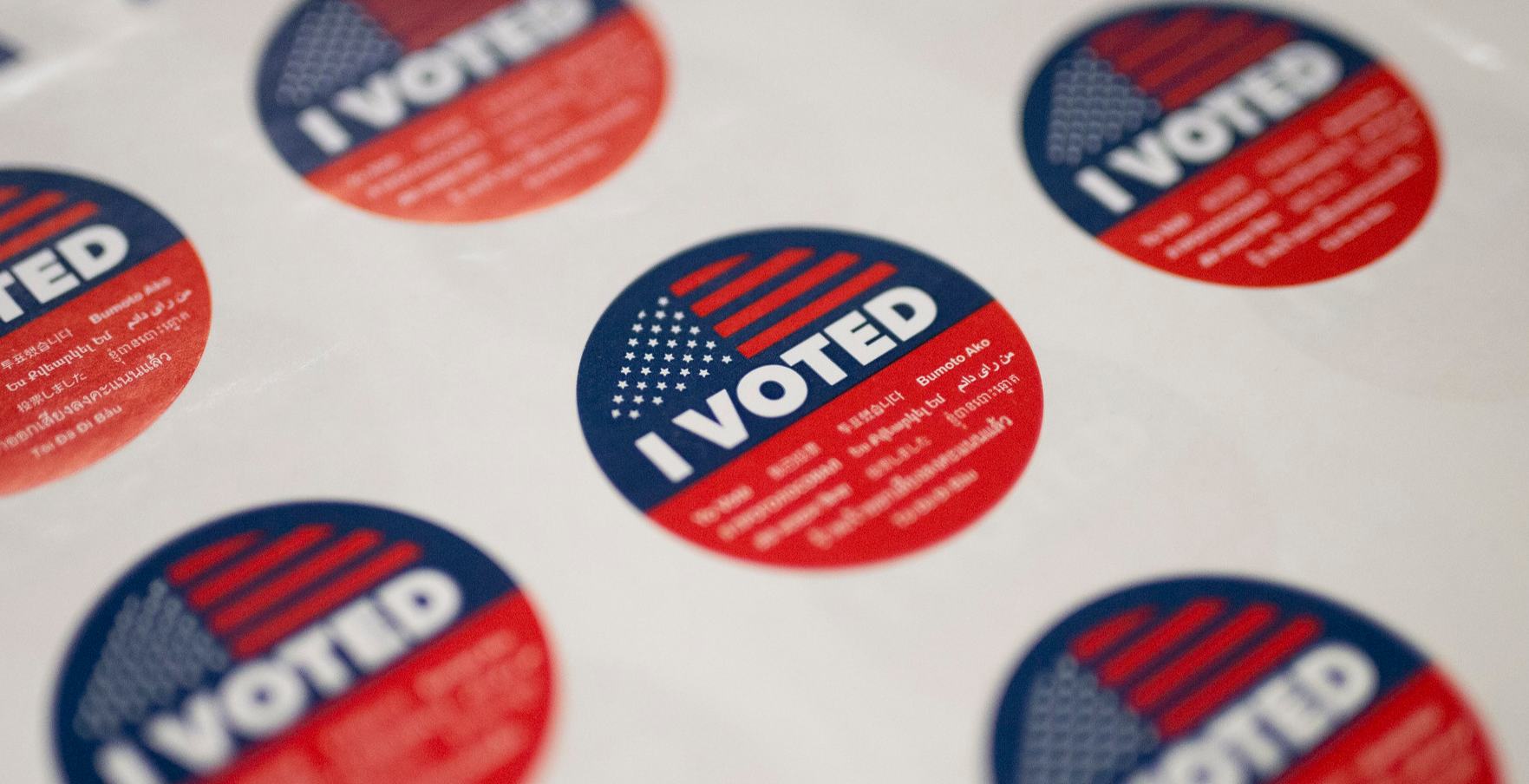
The Unique Women’s Coalition, Equality California and FLUX, a national division of the AIDS Healthcare Foundation, will host their second annual voter education town hall today at the Connie Norman Transgender Empowerment Center in Los Angeles from 7PM to 9PM tonight.
The organizations will present and discuss ballot propositions and measures that will appear on the November ballot and that affect the LGBTQ+ community in this part of the town hall series titled ‘The Issues.’
“The trans and nonbinary community is taking its seat at the table, and we are taking the time and space to be informed and prepare the voter base,” said Queen Victoria Ortega, international president of FLUX.
The town hall will feature conversations through a Q&A followed by a reception for program participants, organizational partners and LGBTQ+ city and county officials.
There will later be a third town hall before the election and The Connie Norman Transgender Empowerment Center will also become a voting location for anyone who feels like they need a safe space to vote, regardless of what voting district they are a part of.
“Our community is really asking for a place to talk about what all of this actually means because although we live in a blue sphere, housing and other forms of discrimination are still a very real threat,” said Scottie Jeanette Madden, director of advocacy at The Connie Norman Transgender Empowerment Center.
Miscellaneous
Chino Valley School District gender notification policy blocked by San Bernardino County Superior Court
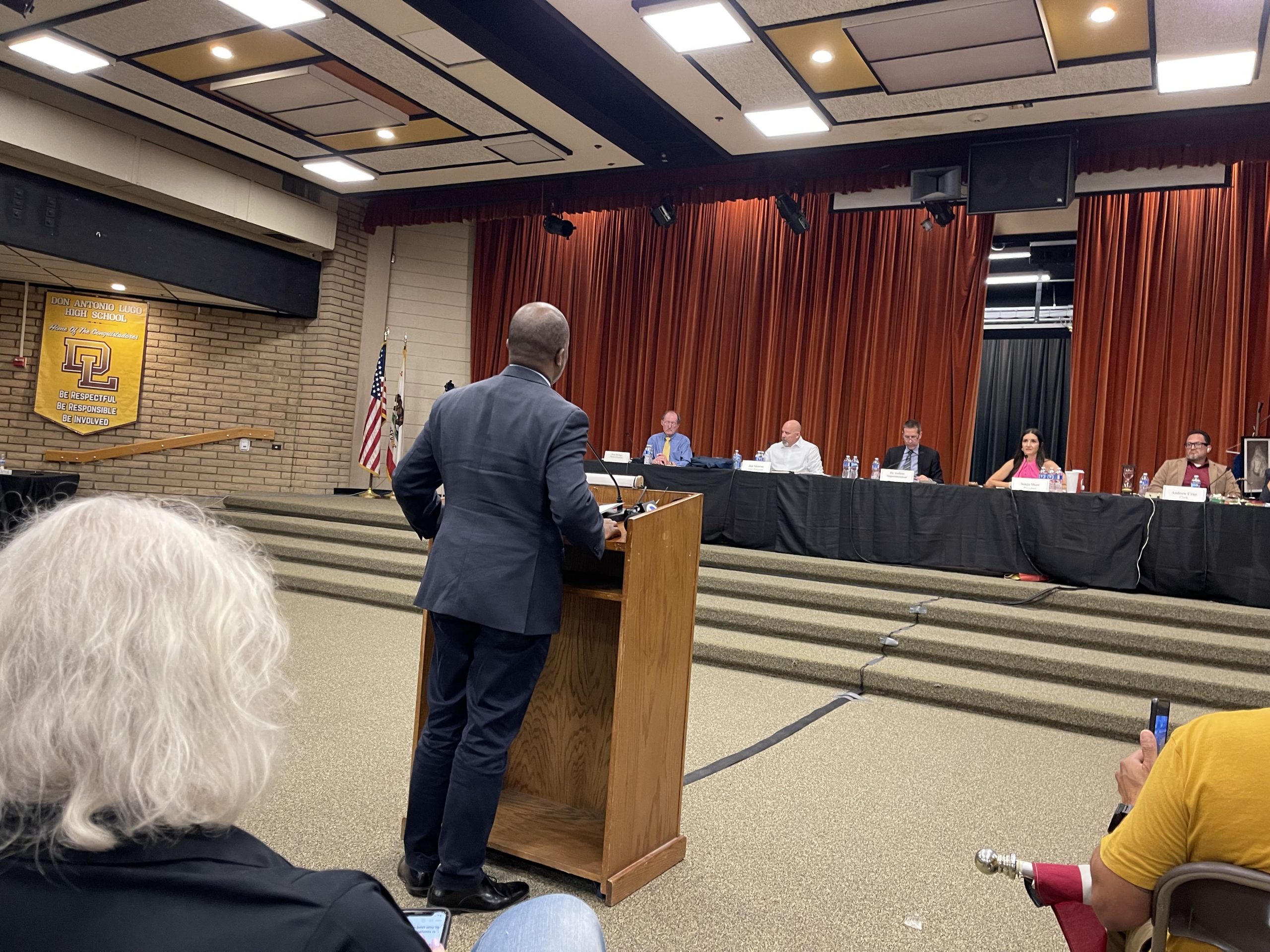
A San Bernardino County judge permanently blocked Chino Valley Unified school board’s policy requiring staff to disclose students’ gender identity to parents without consent.
Judge Michael A. Sachs ruled on September 9, 2024, that the notoriously anti-LGBTQ Chino Valley Unified school board‘s policy is discriminatory,permanently halting enforcement.
“The San Bernardino Superior Court’s decision to issue permanent injunctive and declaratory relief against the Chino Valley Unified School District Board of Education’s forced outing policy is a tremendous victory for LGBTQ+ youth, their families, and the entire Chino Valley community,” said executive director Tony Hoang, regarding the ruling. “This ruling acknowledges that every student deserves to feel safe, respected, and supported in their schools — without fear of being outed against their will.”
Earlier this year, California became the first state to ban gender notification policies after Gov. Gavin Newsom signed AB 1955 into law. The bill was previously The Support Academic Futures and Educators for Today’s Youth Act, or SAFETY Act.
This move was seemingly the last straw tieing Elon Musk to San Francisco, because shortly after the bill proposed by Assemblyman Chris Ward (D-San Diego) was signed into law, Musk announced that he was moving X and SpaceX operations out of California and into Texas.
Last Summer, Attorney General Rob Bonta addressed the Chino Valley Unified School District, urging them to protect student privacy and autonomy.
“By allowing for the disclosure of a student’s gender identity without their consent, Chino Valley Unified School District’s suggested Parental Notification policy would strip them of their freedom, violate their autonomy, and potentially put them in a harmful situation,” said Att. General Bonta in a statement. “Our schools should be protecting the rights of all students, especially those who are most vulnerable, and should be safeguarding students’ rights to fully participate in all educational and extracurricular opportunities.”
The Chino Valley USD policy required certified staff, school counselors and principals to inform students’ parents – with minimal exceptions – when a student requests to change their name, pronouns, access restroom facilities or joining athletic teams that do not align with their assigned gender at birth.
The Court initially granted a temporary restraining order and then a preliminary injunction, or ‘temporary relief,’ while the ruling was to be made.
The case document states that the Board of Directors voted 4-1 to adopt the policy.
The solo board member who voted against the policy stated that “shutting the door on students confiding to a staff member or a teacher, thereby preventing the school from being a ‘supporting place’ and that the ‘notification process’ was effectively throwing students back into the closet and slamming the door.”
The court document also states that “The Board did not cite or describe any statistical or qualitative evidence to support the policy, nor were the statements made considering alternative policies (including gender-neutral alternatives).
Liberty Justice Center, the conservative law firm that represented the district last year, then said it would appeal the decision to sue the district over the policy.
Chino Valley USD began enforcing the policy last summer and by March 7, rescinded it. By August, their continued attack on LGBTQ+ issues continued with their proposed ban on LGBTQ+ books, stating that they are “sexually obscene.”
Though the District rescinded the parental-notification policy, the Board continued to build a case for it and ultimately continued to stand by it.
Sonja Shaw, the Board’s president whose term expires in 2026, stated that she believed these parental notifications would ensure that gender non-conforming individuals would “get better.”
The justification for the policy was that it aided in fostering communication and trust between parents and the District.
The case document also states that the policy is for parents to exercise “effective control” over their children. It notes the Parham v J.R (1979) Supreme Court case where it indicated that parents’ rights can oftentimes trump over the rights of their children.
The court also referenced Mirabello v Olson (2023), a case brought forward by two religious teachers at Rincon Middle School who are in favor of the gender-notification policy being enforced in their district.
The judge ruled in favor of the teachers and stated that they could not be forced to “deceive parents about their children’s gender identity preferences.”
The court document for the case against Chino Valley USD further states however, that “although parents have undeniable rights, a determination that the Old Policy is unconstitutional does not directly infringe upon those rights.”
This means that parents’ rights to communication and trust with the Board of Education –as well as staff and faculty at their child’s school– is not under threat if this parental-notification policy is struck down permanently.
The relationship between parents and their children is not under threat.
The judge stated that “even if some infringement of parental rights occurs, the Court must still balance the competing equal protection interests and there are less restrictive means that restrict both.”
Books
Q&A with Chris Tompkins, author of “Raising LGBTQ Allies”
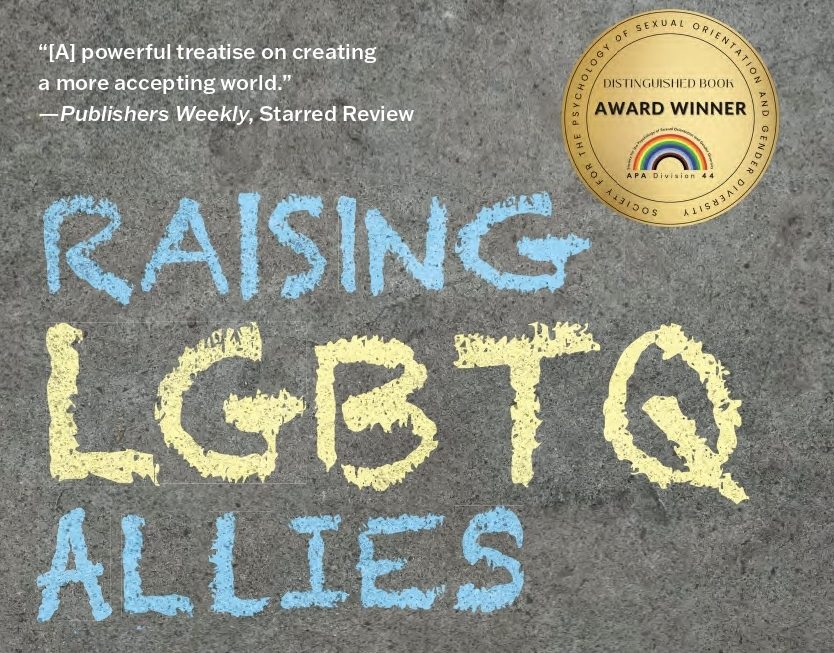
In an enlightening interview with the Los Angeles Blade, Chris Tompkins, author of “Raising LGBTQ Allies,” shares invaluable insights on fostering acceptance and understanding in families and communities. Tompkins, inspired by a personal experience with his young nephew, delves into the complexities of discussing gender and sexuality with children, addressing internalized biases, and the importance of proactive, open conversations. His book, which has garnered critical acclaim, offers a compassionate guide for parents, educators, and LGBTQ individuals alike, aiming to create a more inclusive world for future generations.
Los Angeles Blade: What inspired you to write “Raising LGBTQ Allies”?
Chris Tompkins: A question from my six-year-old nephew inspired me. Despite being out and supported by my family, he asked if a woman sitting next to me was my girlfriend. This made me realize that homophobia can be multilayered, sophisticated, and sometimes manifest as silence.
Los Angeles Blade: How did your upbringing influence your work?
Chris Tompkins: Growing up gay in a religious household, I struggled with my relationship with God. Reconnecting with my version of a “higher power” was transformative. My experiences teaching social-emotional learning and working with the LGBTQ community have shown me the importance of spirituality and self-love.
Los Angeles Blade: Why is your book important for LGBTQ community members, whether they have kids or not?
Chris Tompkins: It helped me realize my own responsibility in raising LGBTQ allies, even as a single, out-of-state uncle. The book encourages LGBTQ individuals to embody the change they want to see in younger generations.
Los Angeles Blade: Who could benefit from your book?
Chris Tompkins: While it’s titled for parents, “Raising LGBTQ Allies” is also a resource for LGBTQ community members to heal from trauma and toxic shame, especially given the current surge of anti-LGBTQ legislation.
Los Angeles Blade: Why is addressing trauma and shame important for the LGBTQ community?
Chris Tompkins: Trauma stems from chronic invalidation, which is common in the LGBTQ experience. Addressing these issues is crucial for mental, emotional, and spiritual wellbeing.
Los Angeles Blade: Can you explain the concept of trauma in the context of LGBTQ experiences?
Chris Tompkins: Trauma can be subtle and insidious, like the “thousand paper cuts” of chronic invalidation. Even in seemingly accepting environments, internalized shame can persist, affecting mental health and leading to coping mechanisms like substance abuse.
Los Angeles Blade: What is “Benign Neglect” and how does it relate to LGBTQ issues?
Chris Tompkins: “Benign Neglect” refers to the unintended consequences of not communicating about important issues. In LGBTQ contexts, it’s often manifested as parents avoiding discussions about gender and sexuality with children, which can inadvertently perpetuate shame and misunderstanding.
Los Angeles Blade: How can parents discuss sexuality with young children in LGBTQ-affirming ways?
Chris Tompkins: Include same-sex examples in everyday conversations and challenge gender stereotypes. Start these discussions early – children as young as six can understand these concepts when explained appropriately.
Los Angeles Blade: How can adults ensure a child has a healthy space for self-discovery?
Chris Tompkins: Be curious and create space for open, honest conversations. It’s our responsibility to learn who children are, not for them to teach us.
Los Angeles Blade: Any advice for adults uncomfortable with these conversations?
Chris Tompkins: Focus on keeping open, not keeping up. It’s okay to feel uncertain, but don’t let that prevent you from having these important discussions.
Los Angeles Blade: What’s your perspective on the recent surge of anti-LGBTQ legislation?
Chris Tompkins: It’s a countercultural dynamic, like a pendulum swinging back after progress. This emphasizes the importance of proactive conversations to challenge bias and raise allies.
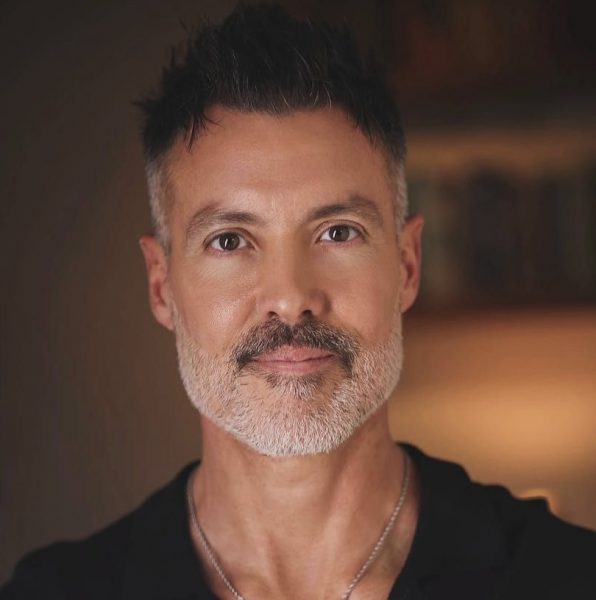
CHRIS TOMPKINS is an LGBTQ-affirming therapist who specializes in gay men’s identity and religious trauma.
Los Angeles Blade: Can you discuss problematic language in LGBTQ conversations?
Chris Tompkins: Words like “issues,” “lifestyle,” “different,” and “trend” can be harmful. They often carry subconscious bias and can unintentionally perpetuate the idea that being LGBTQ is a choice. It’s important to be mindful of our language.
Los Angeles Blade: How can we recognize and unravel our own biases?
Chris Tompkins: Start with self-reflection. Recognize that growing up in a heteronormative culture affects everyone’s beliefs. Consider the possibility that children in your life might be LGBTQ to help disrupt heteronormative thinking.
Los Angeles Blade: What are “messages from the playground”?
Chris Tompkins: It’s a metaphor for subconscious beliefs we pick up in childhood about gender, sexuality, and identity. These “messages” shape our worldview and can perpetuate shame if not addressed.
Los Angeles Blade: When and how should parents answer questions about where babies come from?
Chris Tompkins: Answer when children ask, as their curiosity indicates readiness. Use age-appropriate explanations. Discussing gender and sexuality early helps remove shame and fosters respect for these aspects of identity.
Los Angeles Blade: What’s the most important message you hope parents take from your book?
Chris Tompkins: This is a conversation for all parents, not just those with LGBTQ kids. Do the work yourself and maintain open, honest dialogues with your children.
Los Angeles Blade: How can readers engage more with your work?
Chris Tompkins: Visit my website, www.aroadtriptolove.com, or find me on Instagram: @aroadtriptolove.
Los Angeles Blade: What’s next for you and the book?
Chris Tompkins: “Raising LGBTQ Allies” has been published in Spanish and Vietnamese, with a paperback release on October 1st. It recently received the 2024 APA Distinguished Book Award, which will help it reach more readers, including educators and administrators.
Los Angeles Blade: Where can we find your book?
Chris Tompkins: It’s available wherever books are sold. You can pre-order the paperback edition now.
Los Angeles Blade: Any final advice?
Chris Tompkins: Don’t let fear of saying the wrong thing prevent you from speaking up. Ask for guidance, follow your heart, and remember that having these conversations is changing the narrative for future generations.
CHRIS TOMPKINS is an LGBTQ-affirming therapist who specializes in gay men’s identity and religious trauma. His work has been featured on TEDx, NBC, HuffPost, Psychology Today, the Advocate, and more. An uncle of five, Chris believes the privilege of a lifetime is being able to affirm all children for who they are. www.aroadtriptolove.com
Miscellaneous
African LGBTQ activists meet with Pope Francis
Pontiff met with Clare Byarugaba from Uganda and Ebenezer Peegah from Ghana
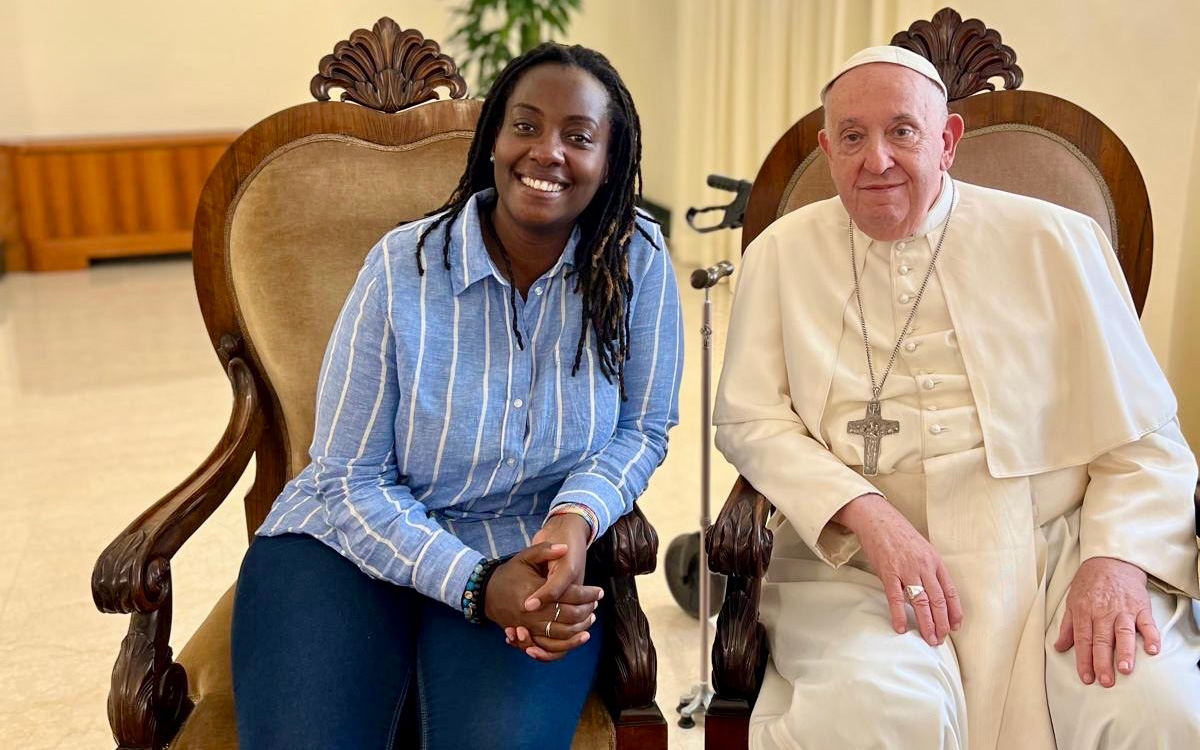
Pope Francis on Tuesday met with two LGBTQ activists from Africa at the Vatican.
Clare Byarugaba of Chapter Four Uganda posted to her X account a picture of her sitting next to Francis. A video that she shared shows Juan Carlos Cruz — a gay Chilean man who is a survivor of clergy sex abuse and a member of a commission that advises Francis on protecting children from pedophile priests — introducing her to the pontiff.
Cruz is also a member of the GLAAD board of directors.
Byarugaba, who also founded PFLAG Uganda, said she was “honored to meet” Francis. She added she briefed him on “the ruinous impact of Uganda’s two in a decade anti-LGBTIQ rights laws,” including the Anti-Homosexuality Act that President Yoweri Museveni signed in 2023, and “the gross human rights violations therein.”
“He reiterated discrimination is a sin and violence against LGBTIQ communities is unacceptable,” said Byarugaba.
The Washington Blade has reached out to Byarugaba for additional comment.
Francis on Tuesday also met with Rightify Ghana Director Ebenezer Peegah.
“With LGBTQI+ criminalization rising in Africa, and Ghana’s anti-LGBTQI+ bill pending, we shared our experiences as queer individuals in Ghana and expressed gratitude to the pope for his progressive stance, especially his opposition to violence and discrimination,” said Rightify Ghana on X. “Pope Francis encouraged us to ‘keep fighting for your rights,’ and that’s exactly what we will do.”
On Tuesday, August 14, 2024, Rightify Ghana’s Director @Ebenezer_Peegah had the honour of meeting Pope Francis @Pontifex at the Vatican.
With LGBTQI+ criminalisation rising in Africa, and Ghana’s anti-LGBTQI+ bill pending, we shared our experiences as queer individuals in.. pic.twitter.com/tYfW1X4W6D
— Rightify Ghana (@RightifyGhana) August 15, 2024
Francis during a Jan. 24, 2023, interview with the Associated Press said homosexuality is not a crime and laws that criminalize it are “unjust.” Francis a few days later reiterated these comments during a press conference on board his plane after it left South Sudan, a country that borders Uganda.
Consensual same-sex sexual relations remain criminalized in South Sudan.
“The criminalization of homosexuality is a problem that cannot be ignored,” Francis told reporters. “Criminalizing people with homosexual tendencies is an injustice.”
Uganda’s Anti-Homosexuality Act, among other things, contains a death penalty provision for “aggravated homosexuality.”
The U.S. after Museveni signed the law imposed visa restrictions on Ugandan officials and removed the country from a program that allows sub-Saharan African countries to trade duty-free with the U.S. The World Bank Group also announced the suspension of new loans to Uganda.
The Ugandan Constitutional Court on April 3 refused to “nullify the Anti-Homosexuality Act in its totality.”
More than a dozen activists appealed the ruling to the country’s Court of Appeal. They filed a second appeal with the Supreme Court on July 11.
Angola, Botswana, Mauritius, and Seychelles are among the countries that have decriminalized consensual same-sex sexual relations over the last decade.
The Namibian government last month appealed a ruling that struck down the country’s apartheid-era sodomy laws.
Burkina Faso’s military government on July 10 announced it plans to recriminalize consensual same-sex sexual relations in the nation. The Ghanaian Supreme Court on July 24 upheld the country’s colonial-era sodomy law.
Ghanaian lawmakers on Feb. 28 approved the Promotion of Proper Human Sexual Rights and Ghanaian Family Values Bill that would, among other things, criminalize allyship. President Nana Akufo-Addo has said he will not sign the bill until the Supreme Court rules on whether it is constitutional or not.
-

 Viewpoint4 days ago
Viewpoint4 days agoI’m a queer Iranian Jew. Why I stand with Israel during this conflict
-

 Congress3 days ago
Congress3 days agoWhite House finds Calif. violated Title IX by allowing trans athletes in school sports
-
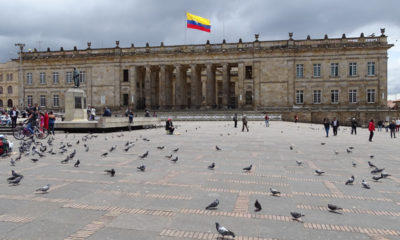
 Colombia5 days ago
Colombia5 days agoColombia avanza hacia la igualdad para personas trans
-

 News4 days ago
News4 days agoDrama unfolds for San Diego Pride ahead of festivities
-

 Books2 days ago
Books2 days agoTwo new books on dining out LGBTQ-style
-

 a&e features2 days ago
a&e features2 days agoLatina Turner comes to Bring It To Brunch
-

 Television3 days ago
Television3 days ago‘White Lotus,’ ‘Severance,’ ‘Andor’ lead Dorian TV Awards noms

